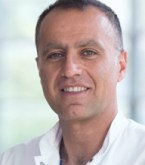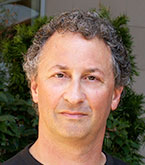Collaborative Research
Collaborative Research
Pancreatic Cancer Collective Convergence Dream Team
PASS-01-Pancreatic Adenocarcinoma Signature Stratification for Treatment-01
GRANT TERM
August 2020-February 2024
INFO
This team is carrying out a randomized phase II clinical trial of FOLFIRINOX compared to gemcitabine/ nab-paclitaxel as first line treatment in metastatic pancreatic ductal adenocarcinoma. Both are current standards of care for stage IV pancreatic cancer; FOLFIRINOX is a combination of four chemotherapies and the gemcitabine/ nab-paclitaxel is a nanoparticle-fused combination of chemotherapies that received FDA approval based in part on the work of the 2009 SU2C Pancreatic Dream Team. In addition to comparing the two treatments, the team plans on developing robust biomarker discovery and validation strategies to create tools that can be used in the clinic to predict early which treatment a patient will best respond to and what may be best avoided.
Pancreatic Cancer Collective Research Team
Computational Approaches To Identifying High-Risk Pancreatic Cancer Populations – Identifying Individuals at High Risk of Pancreatic Cancer through Machine Learning Analysis of Clinical Records and Images
GRANT TERM
May 2019–April 2021
INFO
This team will work to develop risk-assessment models that can identify high‐risk individuals for pancreatic cancer in the general population. Employing advanced machine learning techniques, the risk models will lead to a practical tool that can identify patients who are at elevated risk for pancreatic cancer and should receive additional screening. This will be accomplished by leveraging recent advances in machine learning technology and the availability of rich clinical records and images from large, diverse patient populations from several sources, including Henry Ford Health System, Partners HealthCare, and the Danish National Patient Registry.
Pancreatic Cancer Collective Research Team
Computational Approaches to Identifying High-Risk Pancreatic Cancer Populations – Identification of Genomic and Immune Factors in High-Risk Populations for Pancreatic Cancer
GRANT TERM
May 2019–April 2021
INFO
This team will develop a collection of biomarkers for pancreatic cancer which will be obtained from large clinical and molecular datasets with multiple cohorts. Specifically, they will look at rare gene variants, or modifications of the DNA, in specific regions which, when analyzed together, will predict an individual’s risk of developing pancreatic cancer. The datasets include the UK Biobank, European Study on Digestive Illnesses and Genetics, The Cancer Genome Atlas, and International Cancer Genome Consortium. This approach will be complemented with the examination of tumor microenvironmental factors which are associated with pancreatic cancer risk, including gene expression patterns and response to bacterial and viral infections. This is a high-risk, high-reward project that, if successful, will integrate clinical, genetic, and microenvironmental factors to revolutionize screening and risk-prediction for pancreatic cancer.
Pancreatic Cancer Collective Research Team
Adoptive Transfer of TGF-β Resistant TIL to Defeat Immunosuppressive PDAC New Therapies Challenge
GRANT TERM
November 2018–December 2019
INFO
Reactivation of the immune system’s anticancer function has dramatically improved outcomes for several solid tumor types but has not yet shown similar efficacy for pancreatic cancer. Pancreatic cancer tissue has a high level of transforming growth factor beta (TGF-β). TGF-β effectively counteracts the immune system. Team researchers have developed methods to isolate the few tumor-specific killer T cells (called tumor-infiltrating lymphocytes, or TILs) from pancreatic cancer tissue and greatly expand their numbers in the laboratory. They can then transfer these TIL cells back to the patient for maximal impact against the tumor cells. They have used this approach very successfully in metastatic melanoma and shown that 42% of treatment-resistant patients derived benefit from the therapy. The Team is now developing TIL therapy for pancreatic cancer patients, using engineered TILs that are made resistant to the suppressive effect of TGF-β. In the 14-month period of this grant, they are focusing on demonstrating feasibility and potential efficacy of this approach in the laboratory.
Pancreatic Cancer Collective Research Team
Combined Targeting of MEK1/MEK2 and Autophagy for Pancreatic Cancer New Therapies Challenge
GRANT TERM
November 2018–December 2019
INFO
There is no effective, FDA-approved precision therapy for pancreatic cancer (pancreatic ductal adenocarcinoma or PDAC). The standard of care for most PDAC patients remains conventional cytotoxic chemotherapy, which offers high toxicity with little clinical benefit. The Team has discovered that the survival of pancreatic cancer cells relies on two biochemical processes: 1) Intracellular signaling by the RAS pathway; and 2) Autophagic recycling of the cells’ interior contents to generate building blocks for cancer cell metabolism. Blocking either one of these processes alone has been shown to have negligible effects. But combined blockade of both the RAS pathway (with trametinib, T) and autophagy (with hydroxychloroquine, HCQ), has displayed synergistic antigrowth effects against pancreas cancer cells in vivo. Although both of these FDA-approved drugs have previously been tested in pancreatic cancer patients with little or no effect, they have never been tested in combination. The Team is working toward two goals: 1) elucidating the mechanism(s) by which autophagy is regulated by the RAS pathway, in order to identify predictive biomarkers and new autophagy inhibitors that might be tested in clinical trials; and 2) performing a clinical trial of the T/HCQ combination therapy.
Clinic Trials
Pancreatic Cancer Collective Research Team
Exploiting DNA-Repair Gene Mutations in Pancreatic Cancer New Therapies Challenge
GRANT TERMS
Round 1: November 2018–December 2019 Round 2: January 2020–December 2022
INFO
Building on recent large-scale sequencing efforts demonstrating deficiencies in DNA repair in pancreatic cancer, the team is evaluating DNA repair inhibitors in pancreatic cancer. While clinical trials of therapy using PARP inhibitors alone have shown modest activity in pancreatic cancer, the team’s pre-clinical work suggests outcomes from PARP inhibitor monotherapy can be improved upon by combination treatment strategies involving DNA repair–targeted therapies and be effective in patients experiencing PARP inhibitor resistance. To accomplish this goal, the researchers first studied three classes of DNA repair-targeted therapies-CHK1, ATR, and PARP inhibitors-as single agents in organoid cultures of patient-derived pancreatic cancer tumors. The team sought to identify the most promising combination of DNA repair–targeted therapies and performing drug testing using patient-derived mouse models of pancreatic cancer. Through the organoid and animal model drug sensitivity experiments, the molecular mechanisms of sensitivity and resistance were analyzed. A goal of these mechanistic studies is to develop biomarkers that can be used in clinical trials to pinpoint the pancreatic cancer patient population most likely to benefit from these therapies. In round two, the team hopes to improve on the effect of PARP inhibitors through combination therapy for pancreatic cancer patients with DNA repair mutations, including patients whose pancreatic cancers both have and have not progressed on platinum-based chemotherapy regimens. Their preclinical data suggests that combining gemcitabine with inhibitors targeting regulatory proteins compensating for replicative stress could be effective. Therefore, the team is planning three clinical trials combining gemcitabine with either: 1) an ATR inhibitor, 2) a CHK1 inhibitors, or 3) a WEE1 inhibitor. The team plans to examine these different therapeutic strategies with the intention of identifying combinations for further clinical evaluation.
Pancreatic Cancer Collective Research Team
Immunotherapy Targeting Mutant KRAS New Therapies Challenge
GRANT TERMS
Round 1: November 2018–December 2019 Round 2: January 2020–December 2022
INFO
The goal of the Pancreatic Cancer Collective Research Team: Immunotherapy Targeting Mutant KRAS is to develop a cellular therapy that exploits novel cell engineering to manufacture highly selective anticancer T cells on an individual patient basis. The approach is similar to T cell therapies recently approved by the FDA that target leukemia and lymphoma, except the team is targeting mutant KRAS in pancreatic cancer. The team has been able to isolate T cells specific for mutant KRAS and has successfully grown these cells from multiple donors. In this study the researchers are isolating more KRAS T cells obtained from three groups of people: normal individuals, patients with mutant KRAS tumors, and pancreatic cancer patients who are being treated with vaccines against mutant KRAS. Based on their pre-clinical studies, the team is testing two novel vaccines in the clinic aimed at triggering mKRAS immune responses in patients with resected pancreatic cancer. In round two of funding, the team plans to use the most promising T-cell receptor identified and conduct a clinical trial of engineered T cell therapy for patients with metastatic pancreatic cancer.
Pancreatic Cancer Collective Research Team
Molecularly Targeted Radionuclide Therapy via Integrin AlphaVBeta6 New Therapies Challenge
GRANT TERMS
Round 1: November 2018–December 2019 Round 2: January 2020–December 2022
INFO
The majority of pancreatic cancer patients will present with metastatic disease. The protein called integrin αvβ6 is significantly up-regulated in pancreatic cancer, including in metastases. αvβ6 is a particularly attractive target for peptide receptor radionuclide therapy (PRRT). Certain peptides have been shown to be promising for treatment of advanced neuroendocrine tumors and castration-resistant prostate cancer. Team researchers have developed a radiolabeled peptide for use in PET imaging, and with this new agent have been able to successfully create images of metastases of pancreatic cancers. They now aim to further develop this peptide for research and clinical uses. The team performed preclinical testing including in vivo imaging and assessment of therapeutic efficacy in murine models of pancreatic cancer, toxicology studies, preparation of chemistry manufacturing, control documentation. The team will evaluate the safety and efficacy of the 177Lu-αvβ6-BP therapy in its first-in-human study. The team’s ability to visualize the disease with 68Ga-αvβ6-BP will provide a patient-centered approach to identify only those patients likely to benefit from the 177Lu-αvβ6-BP treatment. By the end of the Round 2 grant term, the Team aims to have identified the most effective dose of the 177Lu-αvβ6-BP therapy and initiate a multi-site Phase II trial in patients with advanced pancreatic cancer.
Pancreatic Cancer Collective Research Team
Targeting SHP2 in Pancreatic Cancer New Therapies Challenge
GRANT TERMS
Round 1: November 2018–December 2019 Round 2: January 2020–December 2022
INFO
More than 90% of pancreatic tumors carry a mutation in the KRAS oncogene. The RAS pathway may be essential to promote the growth of pancreatic cancerous cells. This pathway helps transmit proliferation-promoting signals from the cell’s surface receptors toward the nucleus, where these signals affect the regulation of other key genes that instruct the cell to divide. Mutant RAS genes become more active in signaling, and therefore keep pushing the cell toward uncontrolled proliferation. So far, no targeted therapies are clinically available against the active protein encoded by the mutant RAS gene. The team has discovered that tumors carrying an activating KRAS mutation are sensitive to the inhibition of SHP2, a protein that helps the transmission of the growth-promoting signal from the cell surface receptors. Moreover, the team has found that SHP2 inhibitors cooperate with inhibitors of MEK, a key RAS downstream effector, to achieve better control of tumor growth. Given these findings, the researchers are studying a combination of SHP2 inhibitors and MEK inhibitors for the treatment of KRAS-mutant pancreatic cancer patients.
Pancreatic Cancer Collective Research Team
Targeting Stem Cell Signals in Pancreatic Cancer New Therapies Challenge
GRANT TERM
November 2018–December 2019
INFO
There is a critical need to identify new therapeutics that can more effectively block tumor growth and metastasis in pancreatic cancer. This team has identified a subpopulation of cells in pancreatic cancer that have some characteristics of stem cells and display the capacity to drive disease progression and therapy resistance. A particular regulator of inflammation and the immune response has been found to be highly enriched in pancreatic cancer stem cells and critically required for their ability to drive tumor growth and progression. Based on these findings, the team is testing whether delivery of a pharmacological inhibitor can block growth and progression of pancreatic cancer in genetically engineered models of the disease. This work has the potential for rapid translation and high impact because these inhibitors are already in clinical trials for autoimmune diseases, including two that are delivered orally. Thus, this Team’s studies will pave the way for a clinical trial testing of the efficacy of targeting a regulator of inflammation and the immune response in pancreatic cancer therapy.
SU2C-Lustgarten Foundation-SITC Pancreatic Cancer Convergence Research Team
Computational Deconstruction of Neoantigen-TCR Degeneracy for Cancer Immunotherapy
GRANT TERM
January 2018-December 2020
INFO
The team is building on the work started under a Convergence 1.0 grant but further explore the underpinnings that constitute pancreatic survivorship. By looking at few individuals who survive pancreatic cancer for long periods of time, the team identified an initial set of high-quality neoantigens, or protein tags, on cancer cells that the immune system recognizes. This project will continue the work to understand what makes a high-quality neoantigen and how the microbiome influences how the immune system recognizes it, with the goal of developing a method for creating vaccines to treat pancreatic cancers. This research will have a significant impact on understanding neoantigen-T cell immunobiology and could improve the treatment prospects of pancreatic cancer patients. This Convergence Research Team will work in collaboration with Microsoft Research, utilizing Artificial Intelligence (AI) and machine learning.
SU2C-Lustgarten Foundation Pancreatic Cancer Interception Team
Developing Novel Approaches to Detect and Treat Early Pancreatic Cancer
GRANT TERM
January 2018-December 2022
INFO
This Interception Research Team is evaluating unique and new approaches in combination with radiation therapy and surgery. The team is utilizing SU2C’s unique “tumor organoid” technology in which an individual patient’s tumor cells are grown in the laboratory, creating “mini tumors” which can then be tested to see if a particular treatment is optimal. The team is also studying changes in the tumor microenvironment – the cells that support cancerous cells in a tumor – to see if there are changes and the environment is more or less “inhabitable” following treatment.
Clinic Trials
SU2C-Lustgarten Foundation Pancreatic Cancer Interception Dream Team
Intercepting Pancreatic Cancer in High-Risk Cohorts
GRANT TERM
February 2018–January 2022
Info
This Interception Dream Team seeks to develop a screening test using machine learning techniques to identify and diagnose pancreatic lesions currently not detectable with existing technology. This Dream Team also seeks to develop a first-in-human vaccine to prevent or stop development of PDAC in individuals with an inherited predisposition, who have evidence of precancerous changes in their pancreas and mutant KRAS gene in endoscopic samples. To further enhance earliest possible diagnosis, this Dream Team plans to create a blood test for identifying individuals at risk for PDAC who would be candidates for early detection using imaging technology.
Clinic Trials
SU2C-Lustgarten Foundation Translational Research Team
Chimeric Antigen Receptor T Cell (CAR T) Therapy for Pancreatic Cancer
GRANT TERM
April 2017-March 2021
INFO
This Research Team is studying CAR T cell immunotherapy in metastatic pancreatic cancer patients, looking for changes in DNA “on and off switches” (epigenetic changes) following treatment with CAR T. The team ultimately seeks to identify epigenetic changes for better understanding of why certain patients respond to treatment compared to non-responders.
Clinic Trials
SU2C-Cancer Research UK-Lustgarten Foundation Pancreatic Cancer Dream Team
Reprogramming of Transcriptional Circuitry to Control Pancreatic Cancer
GRANT TERM
January 2016–December 2019
INFO
This Dream Team is continuing the work started on the original SU2C Pancreatic Cancer Dream Team, which found that vitamin D receptor plays an important role in determining pancreatic cancer susceptibility to chemotherapeutic agents. This Team is studying vitamin D receptors to determine if it is an effective “super-enhancer” which improves patient response to chemotherapy.
Clinic Trials
- A phase II, international open label trial of Minnelide ™ in patients with refractory pancreatic cancer
- A Phase II Pilot Trial Of Paclitaxel Protein Bound Plus Cisplatin Plus Gemcitabine and the Addition Of Paricalcitol Upon Disease Progression in Patients With Previously Untreated Metastatic Pancreatic Ductal Adenocarcinoma
- Phase IB/II Trial of High DoseAscorbic Acid (AA) plus Albumin-Bound Paclitaxel
- A clinical trial of the AXL-inhibitor BGB324 plus chemotherapy with nabpaclitaxel
- A Study of Cabiralizumab Given With Nivolumab With and Without Chemotherapy in Patients With Advanced Pancreatic Cancer
- Paclitaxel Protein Bound Plus Cisplatin Plus Gemcitabine and Paricalcitol for Pancreatic Adenocarcinoma (NABPLAGEMD)
SU2C-National Science Foundation-Lustgarten Foundation Convergence Research Team
Liberating T Cell Mediated Immunity to Pancreatic Cancer
GRANT TERM
September 2015-January 2020
INFO
The SU2C–NSF–Lustgarten Foundation Pancreatic Cancer Convergence Research Team is building on previous findings to further explore potential approaches to pancreatic cancer that engage the body’s immune system. A new clinical trial is assessing whether controlled treatment with vitamin D can help immune cells penetrate the pancreatic tumor, increasing the effectiveness of immunotherapy. Additionally, extensive analysis of existing specimens will assess patients’ immune responses to their tumors. The group, comprising physicians, cancer immunobiologists, computational biologists, and biophysicists, strives to better understand the unique immunological microenvironment of pancreatic cancer, develop the technologies needed to take advantage of cancer cell vulnerabilities, and form a multi-institution clinical consortium to more readily implement new strategies that could change the course of this deadly disease.
SU2C-Lustgarten Foundation Pancreatic Cancer Dream Team
Transforming Pancreatic Research to Treatable Disease
GRANT TERM
July 2014–June 2023
INFO
This Dream Team has been investigating combinations of treatments, focused on different and unique pathways involved in immune response to treatment found in the tumor and the “stroma” or the supportive environment that sustains cancer cells in tumors. This team has achieved durable responses to treatment, with a treatment vaccine they developed.
Clinic Trials
- Ibrutinib Combined With Gemcitabine and Nab-Paclitaxel in Patients With Metastatic Pancreatic Cancer (144525)
- A Randomized Phase 2 Study of the Safety, Efficacy, and Immune Response of GVAX Pancreas Vaccine (with Cyclophosphamide) and CRS-207 with or without Nivolumab in Patients with Previously Treated Metastatic Pancreatic Adenocarcinoma
SU2C Pancreatic Dream Team
Cutting off the Fuel Supply: A New Approach to the Treatment of Pancreatic Cancer
GRANT TERM
December 2009–October 2017
INFO
This Dream Team evaluated combinations of treatments, seeking better patient outcomes. The Dream Team’s work led to the first approval for a new pancreatic cancer drug in 30 years. The FDA approved a new combination of drugs that enables longer survival in patients with advanced pancreatic cancer on September 6th, 2013. Pancreatic cancers are scavengers, after “eating” sugars it eats proteins to sustain itself. This drug creates a Trojan horse for the cancer to feed on and it eventually dies. This Dream Team also developed a new method of identifying pancreatic tumors that have spread to the brain and liver, which could significantly aid in diagnosis. The combination of Abraxane and Gemcitabine is now being explored for other types of cancers. This Dream Team was also able to identify that vitamin D receptor plays an important role in determining pancreatic cancer susceptibility to chemotherapeutic agents, under continued investigation by the SU2C-Cancer Research UK-Lustgarten Dream Team.










































